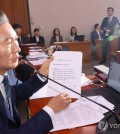- California Assembly OKs highest minimum wage in nation
- S. Korea unveils first graphic cigarette warnings
- US joins with South Korea, Japan in bid to deter North Korea
- LPGA golfer Chun In-gee finally back in action
- S. Korea won’t be top seed in final World Cup qualification round
- US men’s soccer misses 2nd straight Olympics
- US back on track in qualifying with 4-0 win over Guatemala
- High-intensity workout injuries spawn cottage industry
- CDC expands range of Zika mosquitoes into parts of Northeast
- Who knew? ‘The Walking Dead’ is helping families connect
WTO to decide on opening panel on Seoul-Tokyo trade row next month
The World Trade Organization (WTO) will decide next month whether to set up a panel to look into South Korea’s complaint against Japan’s export restrictions, officials said Monday.
The Geneva-based trade body held discussions on the issue that day but stopped short of reaching an agreement because of Japan’s rejection.
The matter will be dealt with in the next Dispute Settlement Body session slated for July 29. According to WTO rules, the panel will be set up automatically, even with Japan’s opposition, unless there is an unanimous rejection from all members.
Early this month, Seoul reopened the case over Japan’s export curbs with the WTO after Tokyo remained unresponsive to Seoul’s call for the removal of export restrictions it imposed one year ago on three key display materials vital to South Korea’s tech industry.
In July last year, Japan announced that it would regulate South Korea-bound exports of photoresist, etching gas and fluorinated polyimide that are critical for the chip and display industries, the backbone of Asia’s No. 4 economy.
Japan says that the measures came on the grounds that South Korea did not effectively control sensitive materials that could be diverted for military use. South Korea believes that it was retaliation against a local court’s decision that ordered Japanese firms to compensate Korean victims for their forced labor during its 1910-45 colonial rule.
South Korea and Japan removed each other from their lists of trusted trading partners last year, reflecting their escalating tension.
Seoul initially filed the complaint with the WTO in September 2019, but it decided to suspend the suit two months later in a goodwill gesture to settle the trade war.
The country, which also had warned of scrapping a military intelligence-sharing pact with Japan, decided to keep the agreement.
Amid the lack of progress in their talks, Seoul in May renewed its call for Tokyo to lift export regulations, but Japan did not provide answers that “meet expectations.”
Disappointed by Japan’s response, South Korea earlier this month went ahead to resume its lawsuit at the international body.
Tokyo has immediately expressed deep regret over South Korea’s decision to reopen the case at the WTO, but reiterated that its export restriction policies were legal and reasonable.
South Korea has argued that Japan “fails to administer its laws, regulations, decisions, and rulings of general application relating to the restrictions on exports in a uniform, impartial, and reasonable manner,” according to a WTO document.
The trade row has not yet had a significant impact on South Korea’s production of affected goods, as the country made efforts to diversify suppliers while fostering its own technologies.
Asia’s No. 4 economy, however, fears that any trade uncertainties may lead to more jitters on its exports which already have been hurt by the new coronavirus pandemic. A poll showed last week South Korea’s exports are anticipated to drop 9 percent in June from a year earlier.











